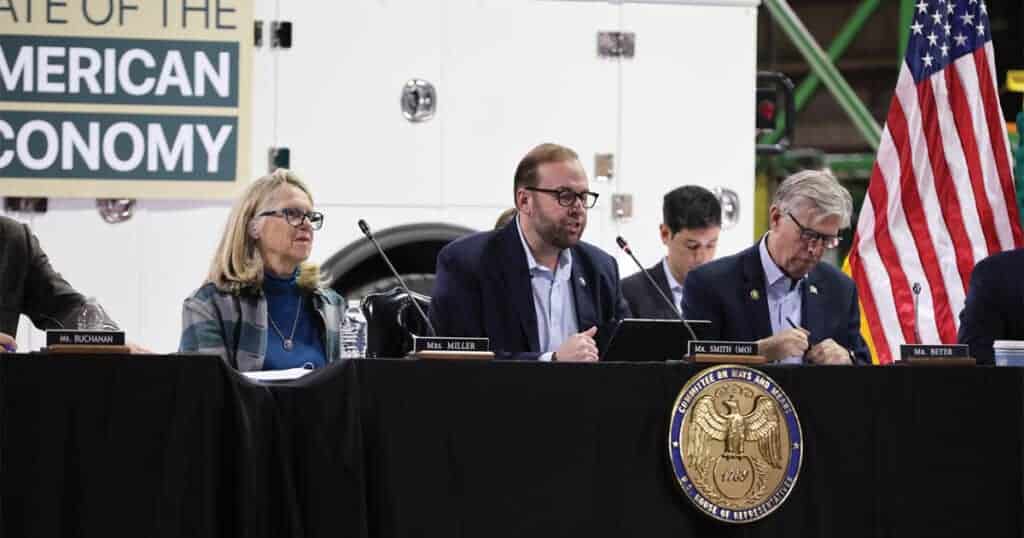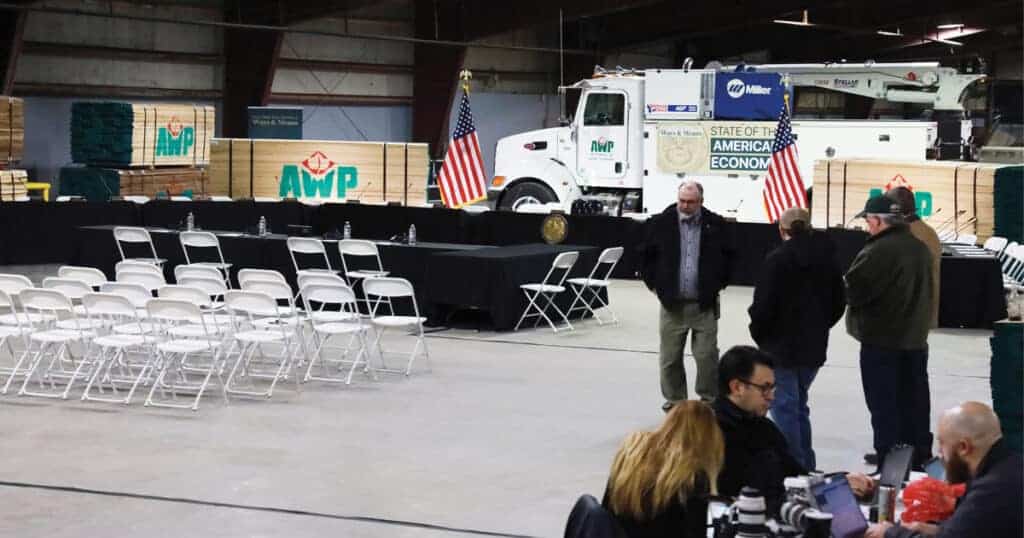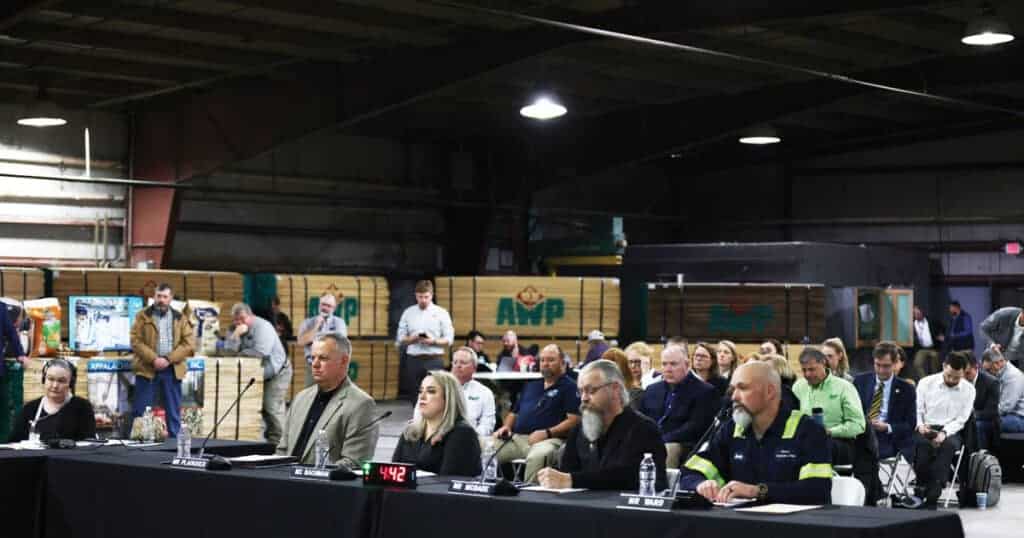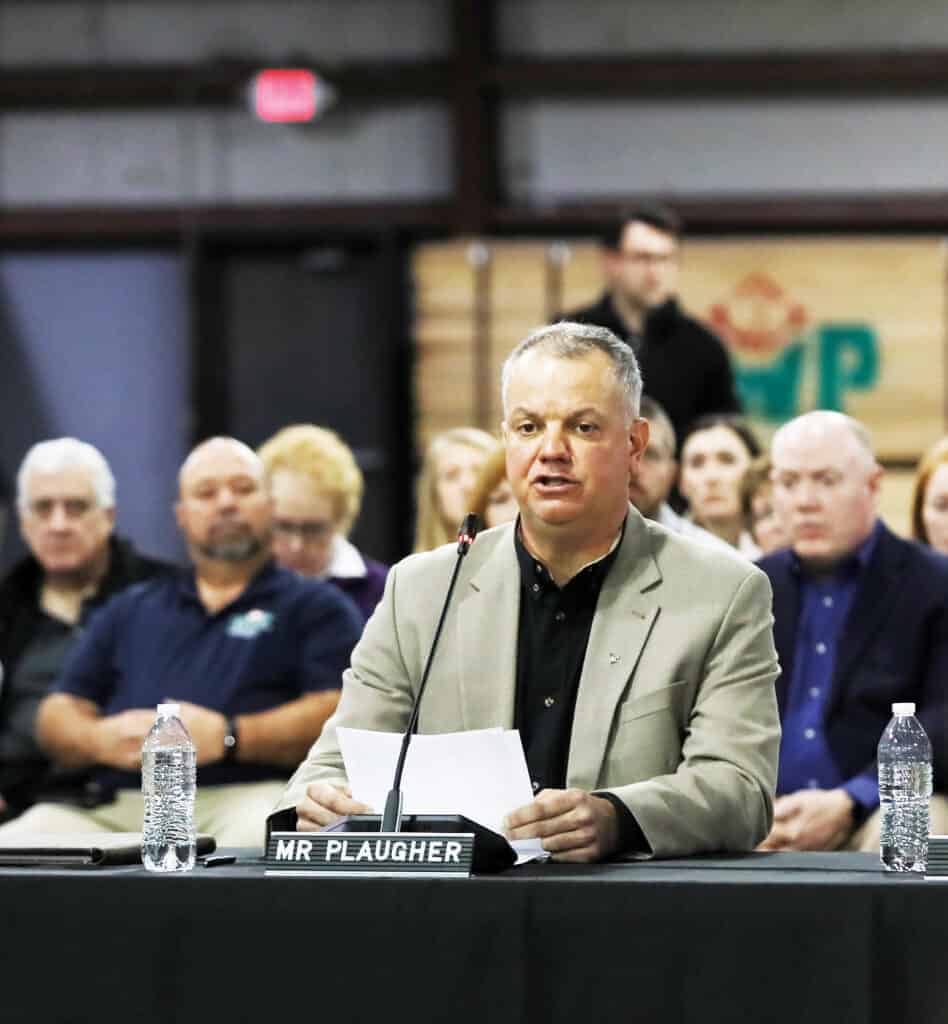
Petersburg, WV—Allegheny Wood Products (AWP), located here, recently hosted members of the U.S. House of Representatives Ways and Means Committee at the Petersburg Dry Kiln Facility. West Virginia Congresswoman Carol Miller, AWP President John Crites II and Phyllis Cole of AWP government relations, were all instrumental in the committee choosing AWP Petersburg as the site for this first in a series of field hearings to be held across the United States. The focus of the hearing was “The State of the American Economy.” Twenty-five Congresswomen and Congressmen attended the hearing.
“Over the last few years, this committee’s work, and that of Congress, has drifted from the needs of these good people. We must course-correct. We must prioritize the voices in rooms like this one and not those of the Washington political class,” said U.S. Rep. and Committee Chairman Jason Smith of Missouri.

Rep. Miller was on hand and is a member of the committee. Several of AWP’s sawmills and yards are in Rep. Miller’s district. Rep. Alex Mooney was also on hand and, although not a committee member, the Petersburg location and other AWP sawmills and yards are in his district. So, he was invited to participate in the hearing.
Four representatives of various business, large and small, in West Virginia testified and took questions from committee members about the difficulties their respective companies have endured in the past two to three years since the pandemic started. Allegheny Wood Products Vice President of Operations Tom Plaugher testified on behalf of AWP. Plaugher was joined by three other witnesses – Ashley Bachman, owner and operator of Cheetah B’s Restaurant in Petersburg, Jamie Ward, manager of the Itman Prep Plant in Wyoming County for Consol Energy, and Wiley McDade, co-owner of Devil’s Due Distillery in Kearneysville, WV.
Plaugher and the other witnesses each gave a prepared five-minute opening statement and were then part of a question-and-answer period that lasted close to two hours.

Energy costs, worker shortages, supply chain issues, excessive regulations and overall increasing costs were all topics covered by Plaugher and the other witnesses. Between both his opening statement and the question-and-answer period Plaugher painted an accurate picture of the challenges faced not only by AWP but also all companies in the hardwood lumber industry, according to a company press release.
“We have a unique, renewable resource here in the Appalachian region that has provided generations of West Virginian’s the means to make a living and to provide for their families. The forest industry contributes $3.2 billion in economic impact to the state of West Virginia on an annual basis. There are over 30,000 people in the state that work in the forest products industry, and it is not just for companies like AWP. We employ over 75 independent logging contractors and 100 independent trucking contractors to support our operations on a regular basis,” commented Plaugher.
Plaugher continued by saying, “With that much economic impact, we are often asked ‘are we running out of trees?’ Fortunately, the answer is a resounding ‘no!’ Recent U.S. Forest Service studies have shown that we are reliably growing 2.5 times the volume that is being removed annually in the Appalachian region. A well-managed renewable resource like this can provide forest products, opportunities for recreation and a long-term tool for carbon capture for generations to come. That is all in addition to the jobs and economic impact these forests provide.”

Plaugher went on to point out five additional issues that have materialized over the past two years that are poised to impact the hardwood lumber industry again in 2023:
• Dramatically Increasing Fuel Costs
o Increased diesel fuel and oil-costs hamper the industry at every link in the chain – from the logging and trucking contractors to the forklifts and loaders AWP operates, to the cost to ship finished products. Every aspect of manufacturing is hampered by this.
• Supply Chain Issues
o Parts and supplies are hard to get and have dramatically increased in price.
o Timely and reliable ability to export goods to customers has been a major hurdle for two years.
• The inability to find qualified labor
o Much of the workforce does not appear to have returned to work following COVID.
• Rising Interest Rates
o This is slowing down the housing market. It makes capital more expensive, and it will put the brakes on the entire industry.
• Increasing regulations and bureaucracy
o Regulatory agencies have ramped up attempts to come out with new initiatives and requirements that both hamper permitting and place more burdens on small business at every turn.
Plaugher closed his opening statement by saying, “The economic outlook for 2023 does not look good, but we remain optimistic. We are blessed with an abundant natural resource, and our industry is made up of some of the finest, hardest working people you will ever meet – both at AWP and the forest products industry as a whole.”
The hearing was live streamed and can be viewed at https://www.youtube.com/watch?v=Rij2pGhl1SA. The hearing starts at 1:18:28 into the video.
The Ways and Means Committee intends to conduct similar hearings across America in the weeks ahead to continue to hear directly from business operators about their struggles in the present economic situation.
To learn more, visit www.alleghenywood.com or https://waysandmeans.house.gov.









